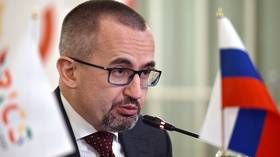
Oleg Stepanov, Russia's ambassador to Canada. © Sputnik
Russia will demand an explanation from Canada for giving a standing ovation in parliament to a Ukrainian man who served in a Nazi division during World War II, Oleg Stepanov, Moscow's ambassador to Ottawa, has said.
The controversy first erupted last week when AP released a photo taken in the House of Commons showing a smiling Vladimir Zelensky, the Ukrainian president, clenching his fist along with Canadian Prime Minister Justin Trudeau, while applauding a person outside the frame. The caption to the photo said that the two leaders "recognize Yaroslav Hunka, who was in attendance and fought with the First Ukrainian Division in World War II before later immigrating to Canada."
House Speaker Anthony Rota introduced Hunka, 98, as "a Ukrainian-Canadian veteran... who fought for Ukrainian independence against the Russians."
"He's a Ukrainian hero, a Canadian hero, and we thank him for all his service," he added.
However, the 'First Ukrainian Division' is also known as the '1st Galician Division', or the 14th Waffen SS-Volunteer Division, which was formed by Nazi Germany in the second half of WWII mostly from Ukrainian collaborators from the western part of the country. The infamous unit took part in brutal anti-partisan warfare, committing atrocities against Polish, Jewish, and Russian civilians.
Speaking to RIA Novosti on Monday, Stepanov said the Russian Embassy would "demand an explanation from the Canadian government," adding that diplomatic notes would be sent to the Foreign Ministry and the prime minister's office.
The envoy noted that he "has no illusions" that this protest will have any effect, arguing that "the current Trudeau cabinet is essentially the epitome of neo-liberal fascism you can't do any business with."
Following the backlash, particularly from the Jewish community, the parliament's speaker issued a public apology for inviting Hunka and accepted "full responsibility" for his actions.
Trudeau's office called the decision the "right thing to do," adding that "no advance notice was provided to the Prime Minister's Office, nor the Ukrainian delegation, about the invitation or the recognition."